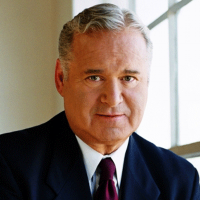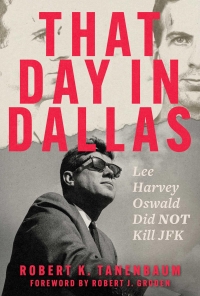Bobby Barnes Letter to Parole Board
Oct 18, 2018 by Robert K. Tanenbaum
Dear Parole Board Chairwoman:
For the past forty-nine years I have been involved with the criminal justice system: as a prosecutor in the New York County District Attorney’s Office where I served as Bureau Chief of the Criminal Courts, ran the Homicide Bureau, and was in charge of the District Attorney’s Office legal staff training program. Thereafter, I served as Deputy Chief Counsel for the Congressional Committee investigations into the assassinations of President John F. Kennedy and Rev. Dr. Martin Luther King, Jr. I taught Advanced Criminal Procedure for several years at my alma mater, the Boalt Hall School of Law at the University of California, Berkeley, and have had published twenty-nine novels and three non-fiction books, all dealing with criminal justice matters.
Early in my career, I was blessed to have been mentored in the justice system by legendary New York County District Attorney Frank S. Hogan and Assistant District Attorney John F. Keenan, now a Federal District Court judge in the Southern District of New York. While they trained me in the administration of justice and in the art of trial practice, they also drilled into me that a prosecutor’s firmness and resolution must be tempered by sensitivity and compassion.
Mr. Barnes’ Courage Testifying Voluntarily, Truthfully against the Harlem Six
On April 29, 1964, a local gang of six males entered a clothing store in Harlem. Their sole intent was to execute the stores’ owners and operators, Hungarian émigés, a young couple, Margit and Frank Sugar. Margit was stabbed to death; Frank was stabbed and left for dead, ultimately surviving. After the media focused on this case, it became highly sensationalized where the gang of stabbers were named by the press the Harlem Six.
When I was assigned to the prosecution team in the early 1970s, Mr. Robert Barnes, Jr., a/k/a Early Martin, was a vital witness and testified against the local gang of killers. His compelling testimony was critical for the prosecution’s case. Not only do I write in support of Mr. Barnes for his cooperation in the truth-seeking process but also because of the perilous nature of the circumstances surrounding his testimony.
As an extraordinary prosecution witness who lived in the same neighborhood as the defendants, Mr. Barnes was in jeopardy, under constant threat of reprisal. However, notwithstanding being in imminent danger, Mr. Barnes testified voluntarily and truthfully. Under the circumstances, it took tremendous courage and strength of character for Mr. Barnes to render truthful testimony at trial in the highly publicized, tempestuous case.
Precedent: The recent New York State Board of Parole grant of parole for Herman Bell (Bell) Inmate #DIN79C0262
The State Board of Parole issued April 17, 2018, parole release date for Bell. In conformity with that order, Bell was granted parole.
On March 26, 2018, based upon newly discovered evidence and pursuant to Title 9 of the Official Compilation of Codes, Rules and Regulations of the State of New York sections 8002.5 et seq. (9NYCRR, Subtitle CC, Parts 8000-8011), I requested that the Parole Board grant a Rescission Hearing based upon newly discovered evidence not available to the Parole Board at the time of the hearing. For your consideration, I have enclosed herewith a copy of the March 26, 2018 letter request.
You will note that Bell murdered, by ambush, three on-duty uniformed police officers: Waverly Jones and Joseph Piagentini both NYPD and Sgt. John Young, San Francisco P.D. In addition, Bell was also convicted of other crimes, including armed bank robbery and attempt to bomb the Engleside police station in San Francisco, California.
On May 12, 1975, at his sentencing for his convictions for the murders of patrolmen Waverly Jones and Joseph Piagentini, his defense team informed presiding State Supreme Court Judge, Edward Greenfield, that Bell and his comrades in arms, were at war with society and sought the violent overthrow of the government. To the point, at pages 170-171 of the defense counsel Mogulescu, immediately prior to the actual sentencing, addressed the Court speaking about all the defendants, notwithstanding that he was officially representing the defendant, Anthony Bottom. He, Mogulescu, confirmed that the defendants are at war with our government: “These men (the defendants) perceive that they are at war and men are killed at war….” “They are beyond rehabilitation. There is no question of that because they feel unless our society is restructured and overthrown, there is no justice, that there is no hope, that there is no way. That is their position….”
Parole release requires conformity with Section 8002.1 (9NYCRR, Subtitle CC, Parts 8000-8011) which states in pertinent part: “…there must be a reasonable probability that, if such inmate is released, he will live and remain at liberty without violating the law and that his release is not incompatible with the welfare society….” The Parole Board, by releasing Bell, determined that Bell met that legal requirement. Therefore, reason and logic suggest that it ought to follow, as night the day, that Robert Barnes, Jr. a/k/a Earl Martin qualifies atop his class.
Mr. Barnes is not at war with society. He does not seek, and never has sought the violent overthrow of the government. Barnes, unlike Bell, is definitely not an “irretrievably depraved” inmate for whom, according to Bell’s trial defense counsel, Mogulescu, rehabilitation is not an option.
Mr. Barnes’ Rehabilitation, Redemption, and Failing Health
I am informed of the following: Mr. Barnes is now over 70 years old, having served more than thirty years in prison. He is without negative citation for the past 18 years. Mr. Barnes has completed and currently engages in several rehabilitation programs, to wit:
Mr. Barnes now finds himself suffering from kidney failure. He believes he will not live much longer and quite naturally prefers not to die in prison.
In my opinion, there is a positive chronological symmetry to Mr. Barnes’ inherent character and disposition: at an early age, he demonstrated tremendous courage and good judgment. Thereafter, he self-admittedly engaged in aberrant, wrongful conduct that resulted in his long-term incarceration. Now he is repentant and contrite, engaging in the rigors of self-improvement as a pathway to freedom and to help others righteously. We are a moral people who believe, when warranted, in redemption. I believe Mr. Barnes qualifies for such consideration.
For the reasons state, I humbly request that Robert Barnes, Jr., be granted parole at your scheduled hearing in May 2017.
Respectfully Submitted,
Robert K. Tanenbaum
For the past forty-nine years I have been involved with the criminal justice system: as a prosecutor in the New York County District Attorney’s Office where I served as Bureau Chief of the Criminal Courts, ran the Homicide Bureau, and was in charge of the District Attorney’s Office legal staff training program. Thereafter, I served as Deputy Chief Counsel for the Congressional Committee investigations into the assassinations of President John F. Kennedy and Rev. Dr. Martin Luther King, Jr. I taught Advanced Criminal Procedure for several years at my alma mater, the Boalt Hall School of Law at the University of California, Berkeley, and have had published twenty-nine novels and three non-fiction books, all dealing with criminal justice matters.
Early in my career, I was blessed to have been mentored in the justice system by legendary New York County District Attorney Frank S. Hogan and Assistant District Attorney John F. Keenan, now a Federal District Court judge in the Southern District of New York. While they trained me in the administration of justice and in the art of trial practice, they also drilled into me that a prosecutor’s firmness and resolution must be tempered by sensitivity and compassion.
Mr. Barnes’ Courage Testifying Voluntarily, Truthfully against the Harlem Six
On April 29, 1964, a local gang of six males entered a clothing store in Harlem. Their sole intent was to execute the stores’ owners and operators, Hungarian émigés, a young couple, Margit and Frank Sugar. Margit was stabbed to death; Frank was stabbed and left for dead, ultimately surviving. After the media focused on this case, it became highly sensationalized where the gang of stabbers were named by the press the Harlem Six.
When I was assigned to the prosecution team in the early 1970s, Mr. Robert Barnes, Jr., a/k/a Early Martin, was a vital witness and testified against the local gang of killers. His compelling testimony was critical for the prosecution’s case. Not only do I write in support of Mr. Barnes for his cooperation in the truth-seeking process but also because of the perilous nature of the circumstances surrounding his testimony.
As an extraordinary prosecution witness who lived in the same neighborhood as the defendants, Mr. Barnes was in jeopardy, under constant threat of reprisal. However, notwithstanding being in imminent danger, Mr. Barnes testified voluntarily and truthfully. Under the circumstances, it took tremendous courage and strength of character for Mr. Barnes to render truthful testimony at trial in the highly publicized, tempestuous case.
Precedent: The recent New York State Board of Parole grant of parole for Herman Bell (Bell) Inmate #DIN79C0262
The State Board of Parole issued April 17, 2018, parole release date for Bell. In conformity with that order, Bell was granted parole.
On March 26, 2018, based upon newly discovered evidence and pursuant to Title 9 of the Official Compilation of Codes, Rules and Regulations of the State of New York sections 8002.5 et seq. (9NYCRR, Subtitle CC, Parts 8000-8011), I requested that the Parole Board grant a Rescission Hearing based upon newly discovered evidence not available to the Parole Board at the time of the hearing. For your consideration, I have enclosed herewith a copy of the March 26, 2018 letter request.
You will note that Bell murdered, by ambush, three on-duty uniformed police officers: Waverly Jones and Joseph Piagentini both NYPD and Sgt. John Young, San Francisco P.D. In addition, Bell was also convicted of other crimes, including armed bank robbery and attempt to bomb the Engleside police station in San Francisco, California.
On May 12, 1975, at his sentencing for his convictions for the murders of patrolmen Waverly Jones and Joseph Piagentini, his defense team informed presiding State Supreme Court Judge, Edward Greenfield, that Bell and his comrades in arms, were at war with society and sought the violent overthrow of the government. To the point, at pages 170-171 of the defense counsel Mogulescu, immediately prior to the actual sentencing, addressed the Court speaking about all the defendants, notwithstanding that he was officially representing the defendant, Anthony Bottom. He, Mogulescu, confirmed that the defendants are at war with our government: “These men (the defendants) perceive that they are at war and men are killed at war….” “They are beyond rehabilitation. There is no question of that because they feel unless our society is restructured and overthrown, there is no justice, that there is no hope, that there is no way. That is their position….”
Parole release requires conformity with Section 8002.1 (9NYCRR, Subtitle CC, Parts 8000-8011) which states in pertinent part: “…there must be a reasonable probability that, if such inmate is released, he will live and remain at liberty without violating the law and that his release is not incompatible with the welfare society….” The Parole Board, by releasing Bell, determined that Bell met that legal requirement. Therefore, reason and logic suggest that it ought to follow, as night the day, that Robert Barnes, Jr. a/k/a Earl Martin qualifies atop his class.
Mr. Barnes is not at war with society. He does not seek, and never has sought the violent overthrow of the government. Barnes, unlike Bell, is definitely not an “irretrievably depraved” inmate for whom, according to Bell’s trial defense counsel, Mogulescu, rehabilitation is not an option.
Mr. Barnes’ Rehabilitation, Redemption, and Failing Health
I am informed of the following: Mr. Barnes is now over 70 years old, having served more than thirty years in prison. He is without negative citation for the past 18 years. Mr. Barnes has completed and currently engages in several rehabilitation programs, to wit:
- Narcotics Anonymous;
- Alcoholics Anonymous;
- Alternatives to Violence – two different levels;
- He is an AIDS/HIV Peer Educator after passing the required Prevention Education Course;
- For two years he worked with a clinical psychologist to improve his interpersonal communication skills;
- He is a regular participant and a facilitator in the Victims Awareness Program;
- Facilitator as an Inmate Program Assistant in the Sexual Offender Program;
- Completed the Aggression Replacement Program;
- His is one semester away from obtaining his degree in Substance Abuse Counseling.
Mr. Barnes now finds himself suffering from kidney failure. He believes he will not live much longer and quite naturally prefers not to die in prison.
In my opinion, there is a positive chronological symmetry to Mr. Barnes’ inherent character and disposition: at an early age, he demonstrated tremendous courage and good judgment. Thereafter, he self-admittedly engaged in aberrant, wrongful conduct that resulted in his long-term incarceration. Now he is repentant and contrite, engaging in the rigors of self-improvement as a pathway to freedom and to help others righteously. We are a moral people who believe, when warranted, in redemption. I believe Mr. Barnes qualifies for such consideration.
For the reasons state, I humbly request that Robert Barnes, Jr., be granted parole at your scheduled hearing in May 2017.
Respectfully Submitted,
Robert K. Tanenbaum


